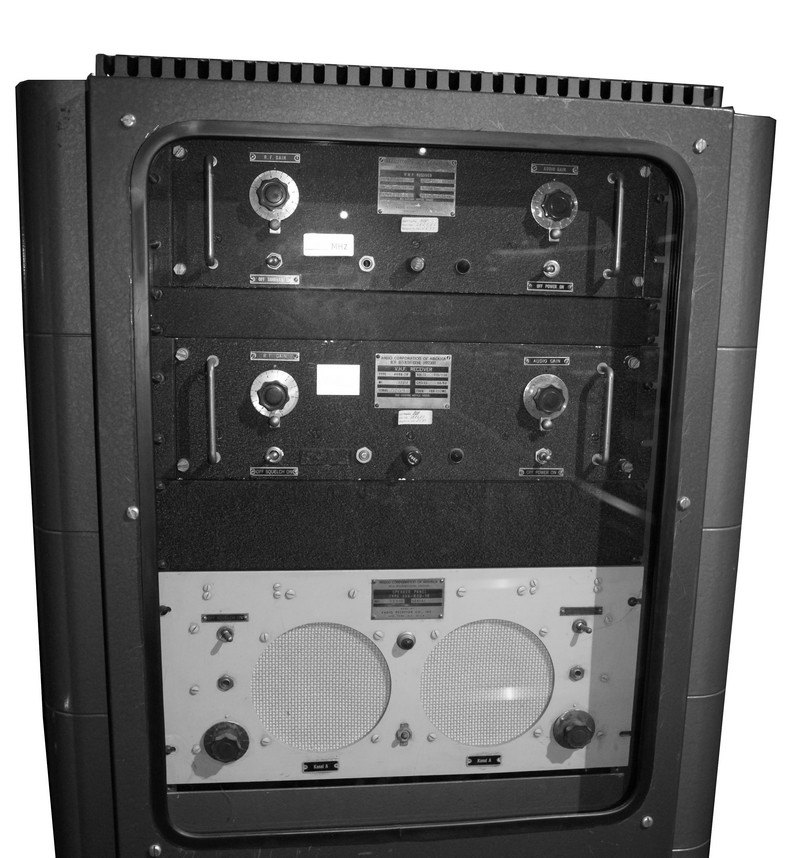|
überarbeitet am 5.1.2013
|
The aeronautical ground station SE-405 consisting completely of RCA equipment
is one of the few "real" aircraft traffic ground stations used by the Swiss
Air Force, and not an adapted or impovised set.
The station consists of a powerful shortwave transmitter and receiver
and two VHF frequency modulated transmitters and receivers.
The equipment was used for fixed operation in military airports or as relays
in mountain station (designation Z-Station or SE-405/f) and for mobile
operation on a truck (ZM-Station or SE-405/m) and was acquired in 1948/50.
Shortwave transmitter AVTG 500R (RCA)
2 - 20 MHz ,
A1 (CW), A3 (AM)
pout A1, A3 500W
Shortwave receiver: RCA CR 91
(improved AR-88 for military use)
73 - 550 kHz, 1480 kHz - 30,5 MHz
VHF - Transmitter (2 samples)
105 - 156 MHz ,
A2 (telegraphy modulated), A3 (telephony AM)
pout A2, A3 225 W
VHF - Receiver: two AVRG-2R or E-505 / BC-624
100 - 162 MHz
|
 |
When all aircraft communications were moved to the VHF frequency band in the
late fourties, there was the demand to acquire completely new equipment for the
aeronautical ground stations for the ground - air traffic. Additionally, "mountain
stations" had to be established to make links between the airfields and fighter mission
controls.
The RCA ground station purchased for this purpose consisted of shortwave and
VHF equipment and got the designation SE-405 / Z-Station.
 |
The shortwave transmitter is a AVTG 500 R, a 500 Watts
shortwave transmitter constructed by RCA, whoch can operate in CW telegraphy (A1)
and telephony (A3). The shortwave band is covered in three ranges, all frequencies
are crystal controlled.
In the 2 - 5 MHz frequency range, the crystal frequency equals the operation
frequency, in the 5 - 13 MHz range, the operation frequency is the double crystal
frequency and in the 13 - 20 MHz range, the crystal frequency is tripled. Different
coil sets had to be used for the different band ranges. To match the antenna,
a BC-939 A antenna tuner is used. |
In the VHF air band, two transmitters with an output power of 225 Watts each
are used, they cover 105 - 156 MHz. In a similar way, by plugging in shorting
plugs, frequency doubler or multiplier stages are activated or bypassed. The
transmitters can operate in telephony (A3, still in use today) and modulated
telegraphy (A2) with an internal AF tone generator active. |
 |
 |
| The shortwave receiver of the Z-Station is a RCA CR-91, a variant of
the classic RCA shortwave receiver RA-88LF with additional longwave coverage.
The single conversion superhet with an IF of 455 kHz uses fourteen valves. |
The VHF receivers are two AVRG-2R, the RCA VHF receivers operate on a fixed
frequency, both receivers are connected to one speaker unit. |
For measurement purposes, a signal generator Boonton Modell 80 (to tune the
VHF transmitters) and a kathode ray oscilloscope Dumont Modell 292 made part of
the station equipment.
In 1948, eleven Z-Stations / SE-405 have been ordered, the mobile units
ZM / SE-405/m served until 1969, the fixed stations SE-405/f were faded out in 1990.
I would be very thankful for further information and images from field use.
further information:
The station is displayed at the Swiss Air Force museum at Dubendorf.
d: technical handbook of the Z-Station
© 5.1.2013 Martin Bösch
|





